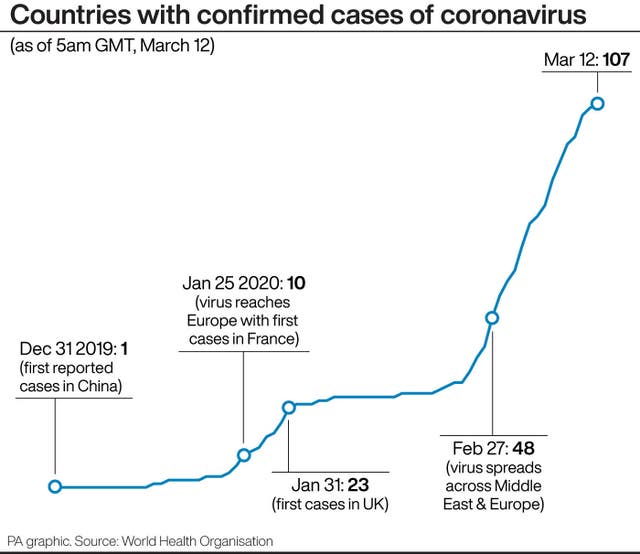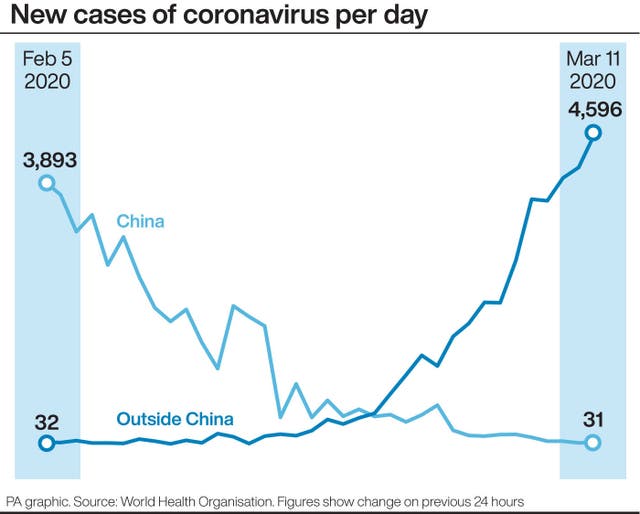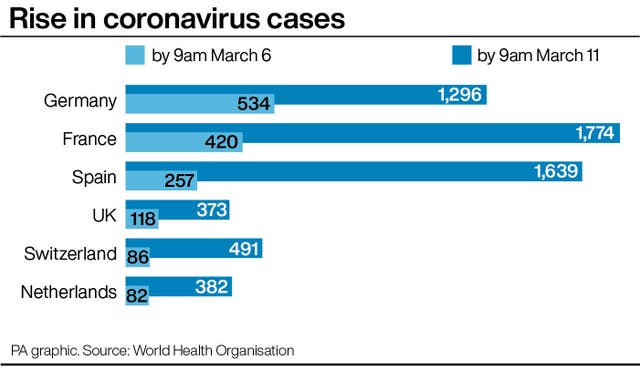UK response to coronavirus outbreak set to enter new phase
Prime Minister Boris Johnson will chair a meeting of the Cobra emergency committee to decide on the next steps.

Boris Johnson is expected to accept that the coronavirus outbreak can no longer be contained in the UK, signalling the start of the next phase in the battle against Covid-19.
The Prime Minister will chair a Cobra meeting at lunchtime on Thursday where ministers are expected to agree to move into the “delay” stage of the process.
Moving to delay would mean social distancing measures could be brought in, such as restricting public gatherings and issuing more widespread advice to stay at home.
It comes as the UK’s chief medical officers and officials from the General Medical Council and NHS England wrote to doctors saying they may need to work outside their usual area of expertise and in unfamiliar circumstances as they deal with a “very abnormal emergency situation” in the peak of an epidemic.
The letter said part of a professional response is a “rational approach to varying practice in an emergency”, and GP practices, hospitals, trusts and health boards should ensure clinicians are supported to do this.
“They must bear in mind that clinicians may need to depart, possibly significantly, from established procedure in order to care for patients in the highly challenging but time-bound circumstances of the peak of an epidemic,” the letter said.
The expected shift in UK policy comes as Donald Trump dramatically escalated the US response to the coronavirus pandemic, slapping a travel ban on continental Europe.
The suspension of travel between the United States and Europe – excluding the UK and Ireland – will last for 30 days starting on Friday.
Mr Trump made the announcement in an Oval Office address to the nation, blaming the European Union for not acting quickly enough to address the outbreak of the virus and saying US clusters were “seeded” by European travellers.
Chancellor Rishi Sunak played down the prospect of the UK imposing similar travel restrictions, but acknowledged the US decision could have a knock-on effect on the British economy.

He told BBC Radio 4’s Today programme: “With regard to flight bans, we are always guided by the science as we make our decisions here, and the advice we are getting is that there isn’t the evidence that interventions like closing borders or travel bans are going to have a material effect on the spread of the infection.”
Thursday’s Cobra meeting comes after eight people with Covid-19 were confirmed to have died in the UK, while the total number of positive cases rose to 460.
A Cabinet minister, who has not been named, was self-isolating while awaiting a test result after coming into contact with health minister Nadine Dorries.
Ms Dorries is self-isolating at home after being diagnosed with the illness.
A source confirmed fellow health minister Edward Argar is also self-isolating at home “as a precaution” after having lunch with Ms Dorries on Thursday, the day she started to feel unwell.

Mr Sunak told the BBC: “This has obviously now impacted Parliament and government, and we are dealing with it, like all other businesses are going to have to start dealing with it.”
Public Health England was carrying out a “very thorough and rigorous process” to trace people who had been in close contact with Ms Dorries, he said.
In other developments:
– The annual St Patrick’s reception at the White House was cancelled, although Taoiseach Leo Varadkar was still expected to hold talks with Mr Trump
– The FTSE 100 index of leading London-listed companies fell more than 5% in early trading following the World Health Organisation’s declaration of a pandemic
– Hollywood star Tom Hanks announced he and wife Rita Wilson have been diagnosed with coronavirus

– Barchester Care Homes, which runs more than 200 care homes in the UK and has more than 11,000 residents, sent a letter to residents, patients and visitors saying it was stopping family members and friends making routine visits to its homes. It later said it meant visits should be “minimised”.
– Twitter has informed all staff globally they must work from home as the social media platform heightened its response to the coronavirus outbreak
– A paramedic with the East of England Ambulance Service has tested positive for coronavirus.
Mr Sunak said Mr Trump’s decision to halt travel to the US from most of Europe could have a knock-on effect on the UK economy.
Asked about the impact on business and tourism that the ban is likely to have, he told BBC Radio 4’s Today programme: “The US is still deciding the details of what exactly that means, but you are right.
“As I talked about yesterday, there will be an impact on the demand side of our economy as people are unable to spend in the way they normally would and travel, but it also affects the supply chains for businesses and that impacts the supply side of our economy.
“As those supply chains are disrupted, the productive capacity of our economy will shrink for a period of time.
“With regard to flight bans, we are always guided by the science as we make our decisions here and the advice we are getting is that there isn’t the evidence that interventions like closing borders or travel bans are going to have a material effect on the spread of the infection.”
On Wednesday, WHO director-general Dr Tedros Ghebreyesus said the number of cases outside China has increased 13-fold in the past two weeks, and the number of affected countries has tripled.
He said there had been “alarming levels of inaction” in some parts of the world.
Meanwhile, data published on Thursday suggests the NHS 111 system is coming under increasing pressure.
There were 1.6 million calls to NHS 111 in England in February, an average of 56,000 a day. This is up from 1.4 million calls in February 2019, which was an average of 50,000 a day.
Only 70% of calls were answered within 60 seconds – the lowest for any calendar month on record, and down from 74% in Feb 2019.
The proportion of calls abandoned after waiting longer than 30 seconds was 8%, up from 5% in Feb 2019.





